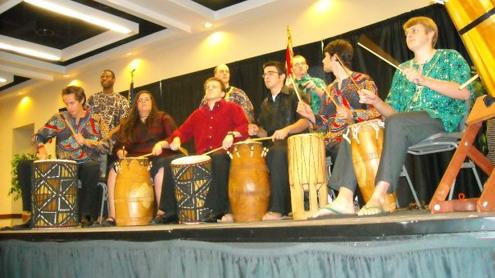 Apwonjo is an organization whose primary goal is to bring awareness of social injustices happening in sub-Saharan African countries, according to the Apwonjo website.
Apwonjo is an organization whose primary goal is to bring awareness of social injustices happening in sub-Saharan African countries, according to the Apwonjo website.
Linn Groft, a senior majoring in interdisciplinary studies, global studies in community health and development and president of Apwonjo, considers the basis of the group to be, “to educate oneself and others, as well as provide action that can make a difference in the world.”
Apwonjo also wants to highlight the reality of what is occurring in Africa, treasurer Chandni Patel said.
“We want to bring awareness to what and why things are actually going on,” Patel said. “We want to educate people and let them know things such as why there are issues such as poverty and lack of education in sub-Saharan Africa. We want people to know the truth.”
Seth Appiah-Opoku, professor in the geography department and advisor of Apwonjo, spoke on issues that people may need to be aware of that are occurring in sub-Saharan Africa.
“Most often the images that come to mind when Africa is mentioned include poverty, civil war, diseases, instability, hunger and malnutrition,” said Appiah-Opoku, who was born and raised in Africa. “The positive news in Africa is overlooked and that’s what I want the UA students to be aware of. Good things are happening in Africa.”
Vice president Natalie Hallmark, a senior majoring in psychology, also talked about education concerning sub-Saharan Africa.
“We are a group dedicated to learning the positive and negatives,” Hallmark stated. “We want to leave the stigma of Africa being a victim behind.”
Last semester, The Crimson White reported on Apwonjo’s Uncommon Courage event.
“Uncommon Courage featured three mock refugee tents that displayed different aspects of the life of an African refugee,” Groft explained. “The event featured music from the African Music Ensemble and special guest El-Fadel Arbab, a refugee from Darfur.”
Apwonjo has a few events planned this semester with the first taking place in conjunction with Capstone Village.
“We will be participating in the Capstone Village: Passport to the World Active Aging Week,” Patel said.
Sept. 21, known around the world as the International Peace Day holiday, is the day set aside for Africa during Active Aging Week.
“There will be a speaker. We’re going to teach the residents about International Peace Day, and we will be playing African games, doing African crafts and showing a film,” Patel said. The all-day event will also feature the University’s African Drumming Ensemble.
Apwonjo was started in 2006 by students interested in learning and getting involved with Invisible Children United, Groft said.
Advisors and officers of Apwonjo feel the group is a great way to help people and make a positive impact in the lives of others.
“I admire Apwonjo because it gives students an opportunity to connect with people and be involved in the lives of the people of Africa,” Apwonjo adviser Beverly Hawk said.
In the words of Groft, Apwonjo welcomes people from all backgrounds.
“There are a lot of ways to be involved with any major or interest,” Groft stated. “If you’re studying communications you can get some PR experience; if you’re in business, you can learn to work internationally.”
Some of Apwonjo’s members have taken their travels out of the U.S. and into Africa.
“Even though we don’t know the people over there, many of us have gone to Africa,” Patel stated. Appiah-Opoku recalled when Groft worked as a volunteer in an orphanage in Uganda.
Members of Apwonjo said they feel that being a part of the club provides one with the chance to get involved and learn more about factors such as culture and lifestyles in sub-Saharan Africa that one may not learn about in a regular lecture class.
“Besides being around and working with an awesome group of people, being a part of Apwonjo provides an outlet for those who are interested in international or African issues and want to work to fight social injustices,” Hallmark said.
Patel said that although people here do not know the people in Africa personally, there is still an impact being made.
“We don’t want people to feel sorry for them,” Patel said. “We’re not that different from each other besides the fact that we’re here and they’re over there and the conflicts they are burdened with. We’re all interconnected in some way.”









